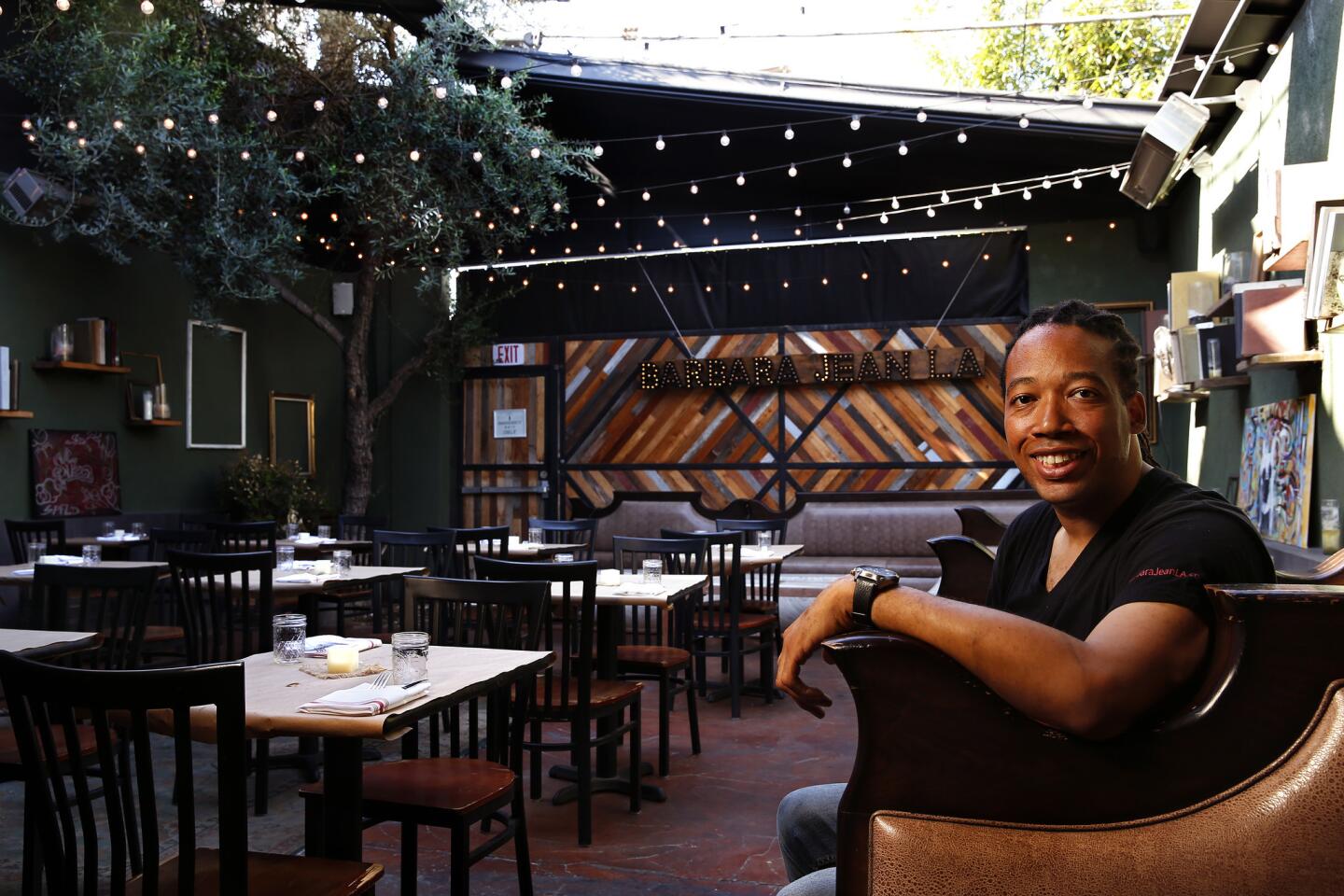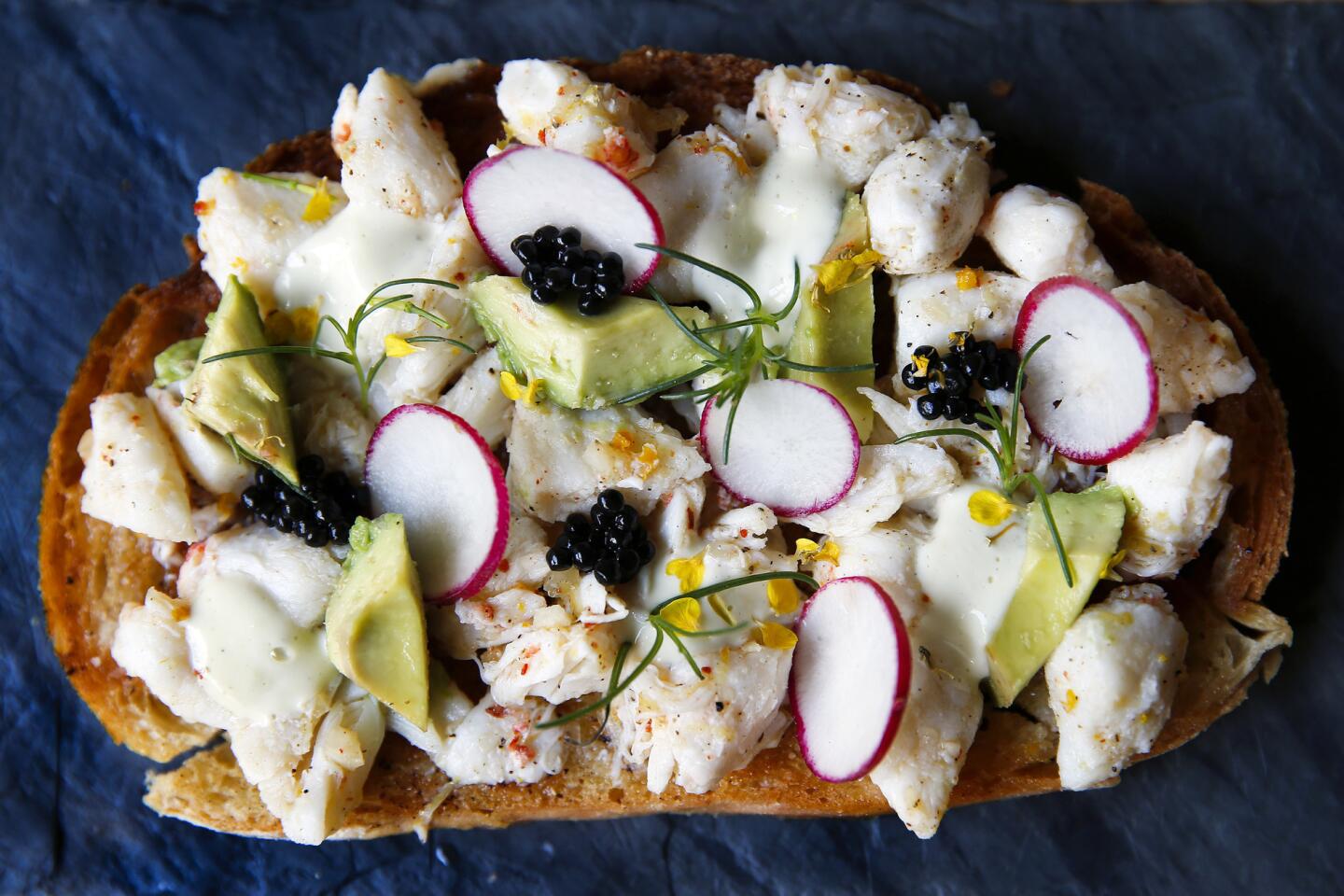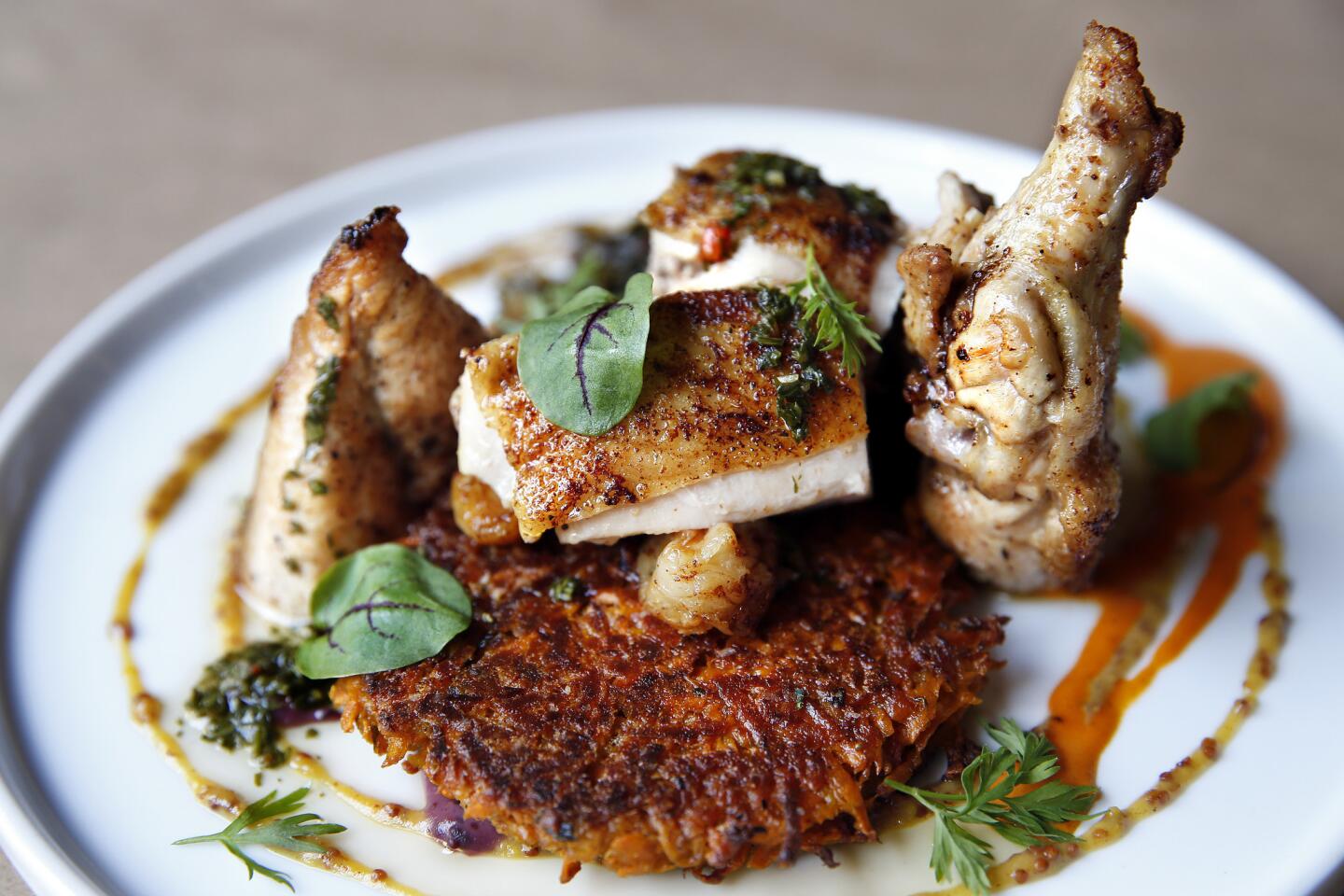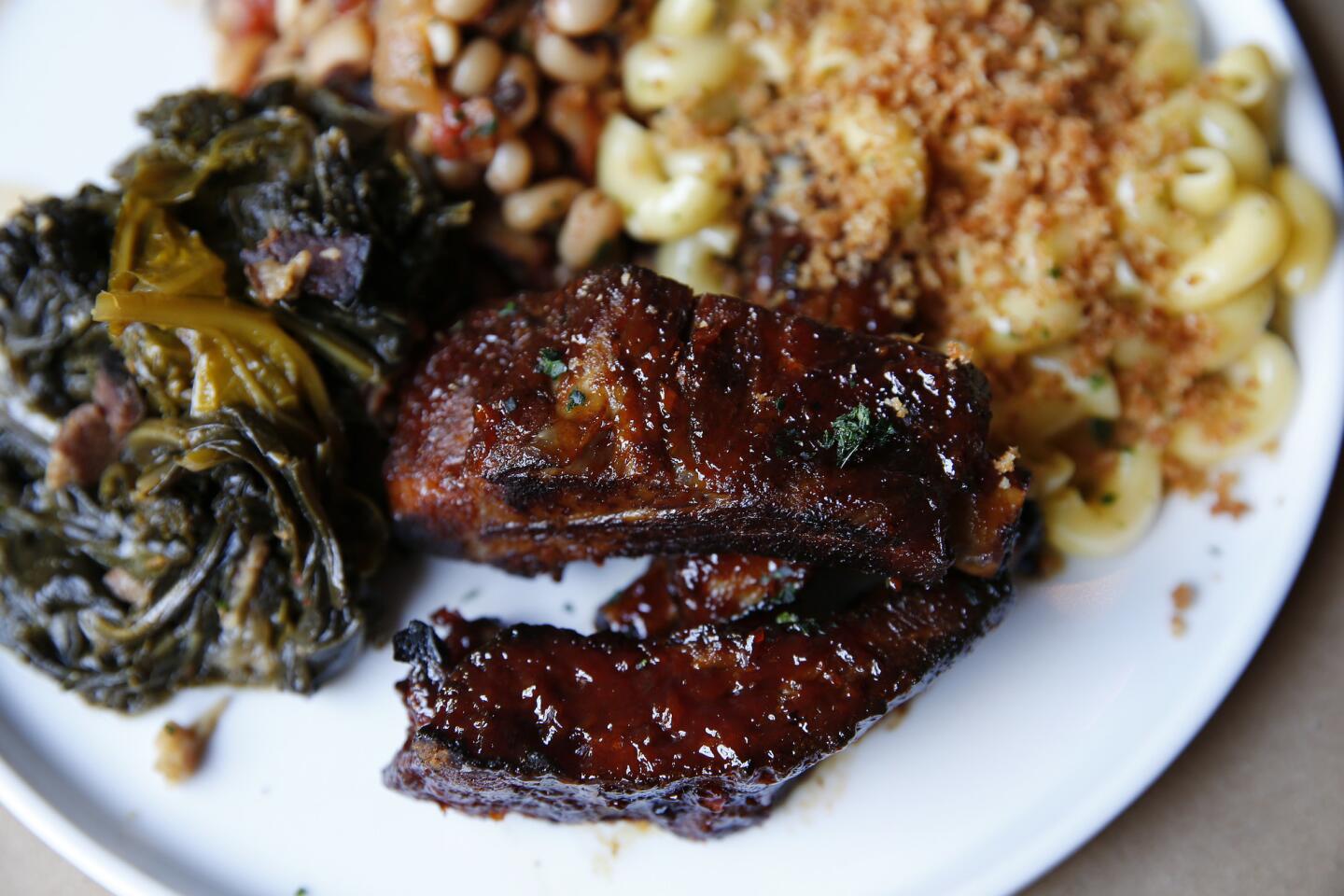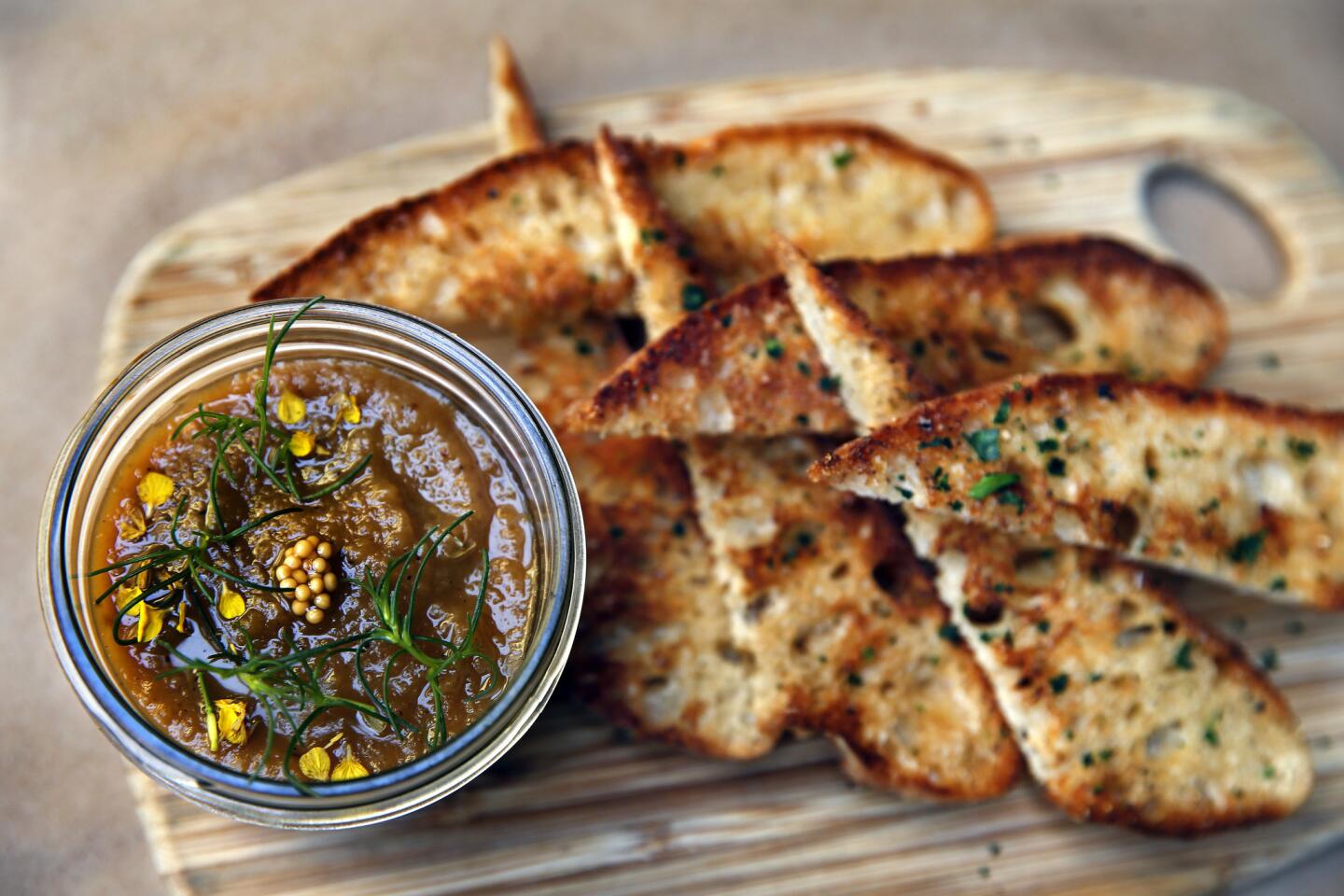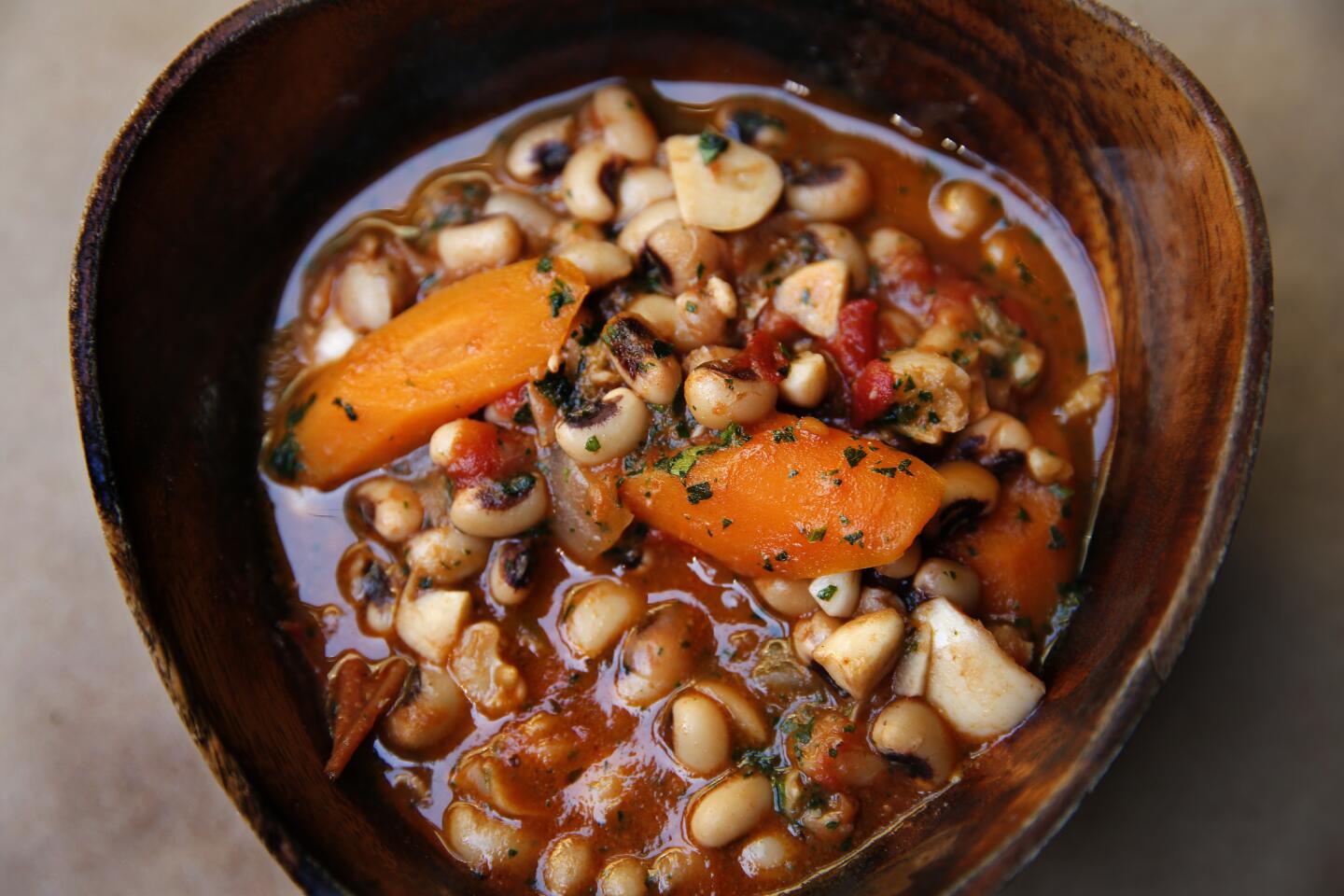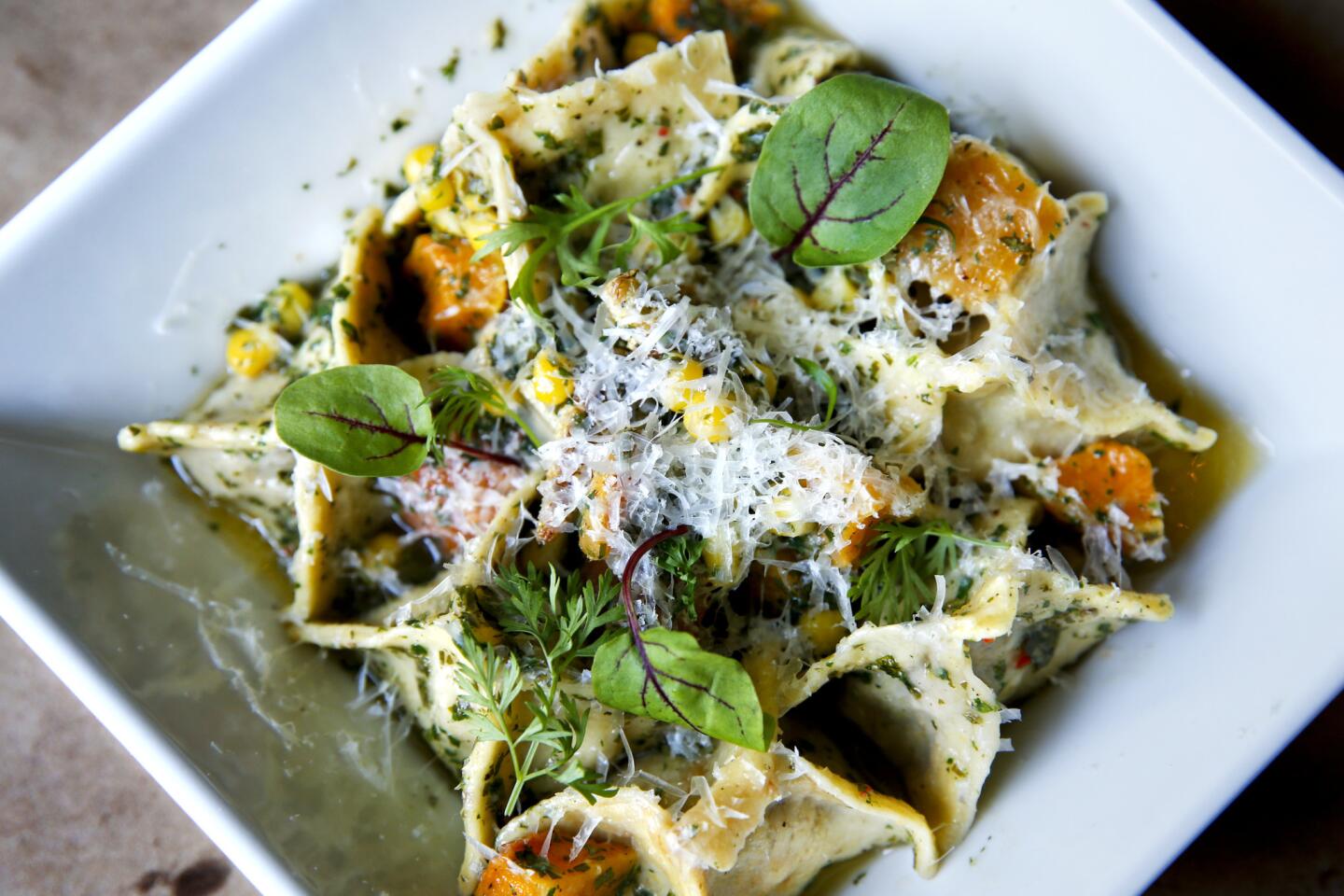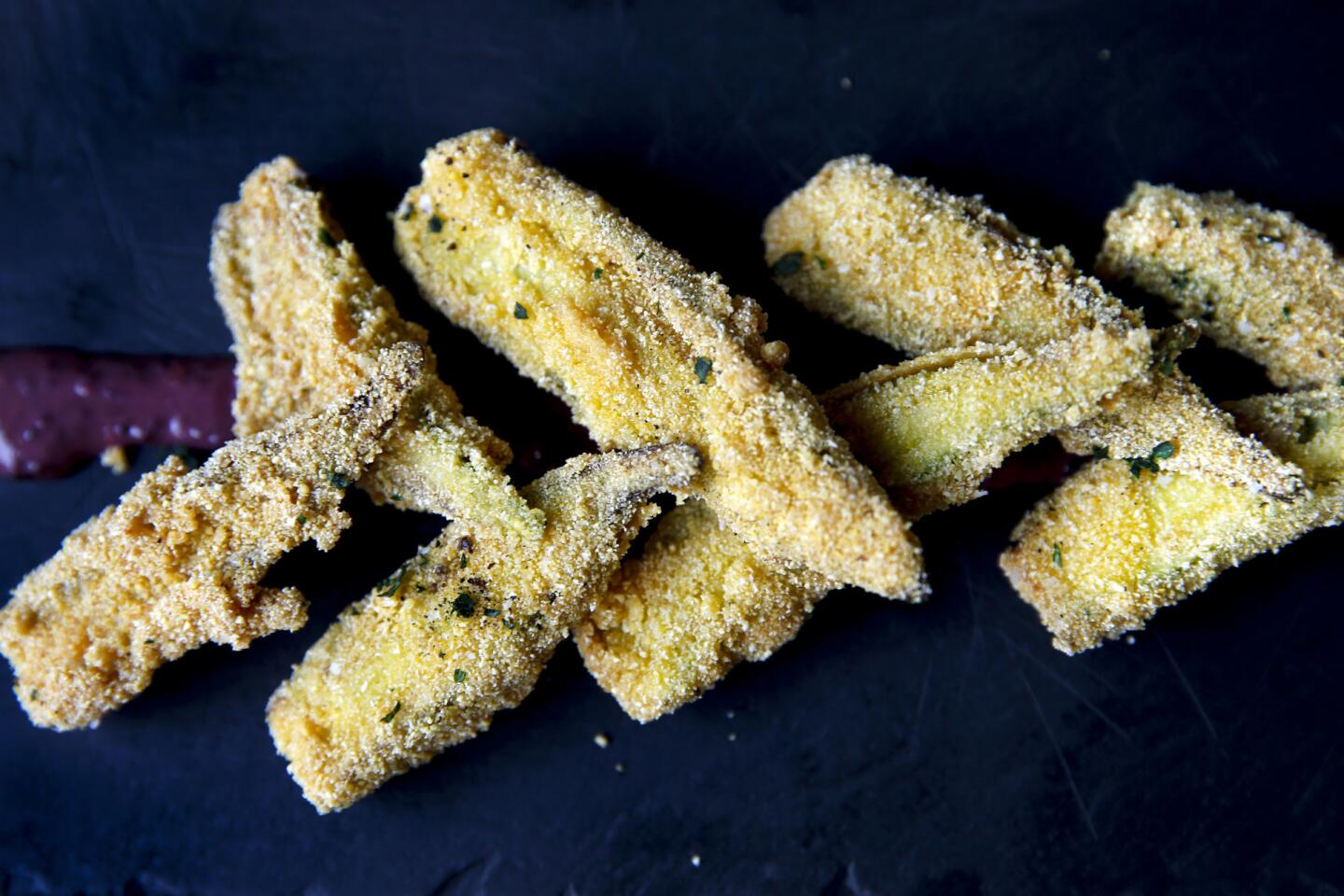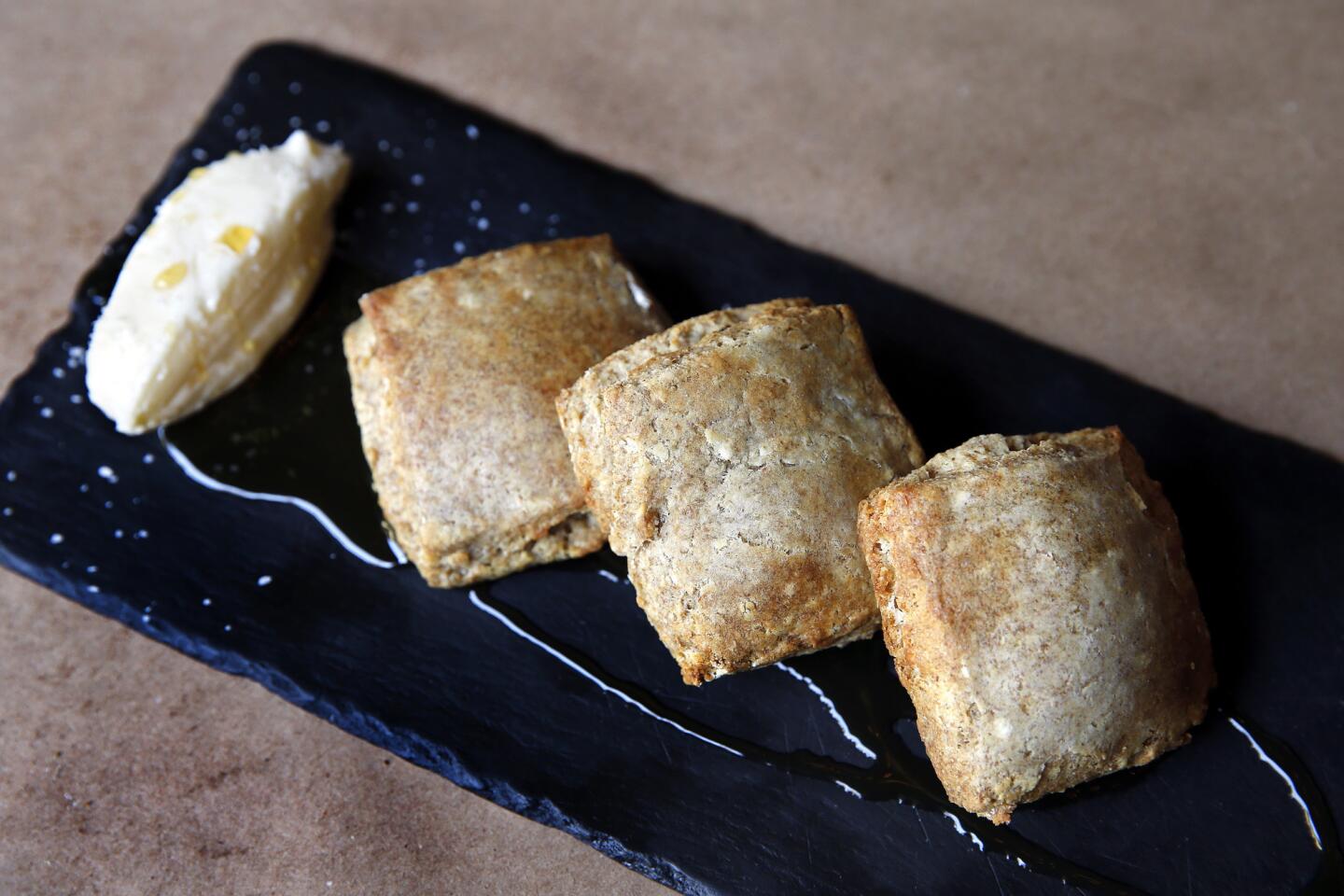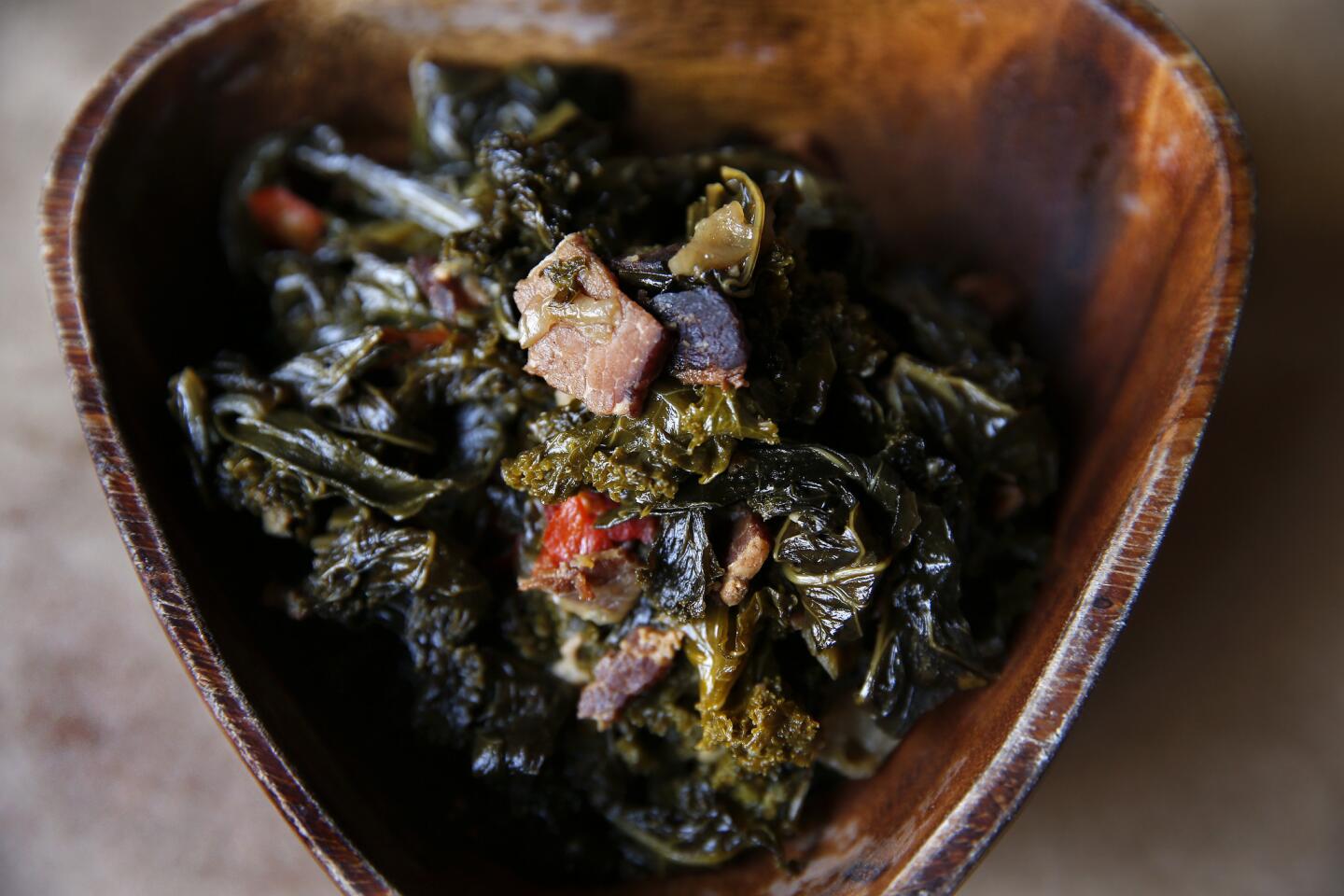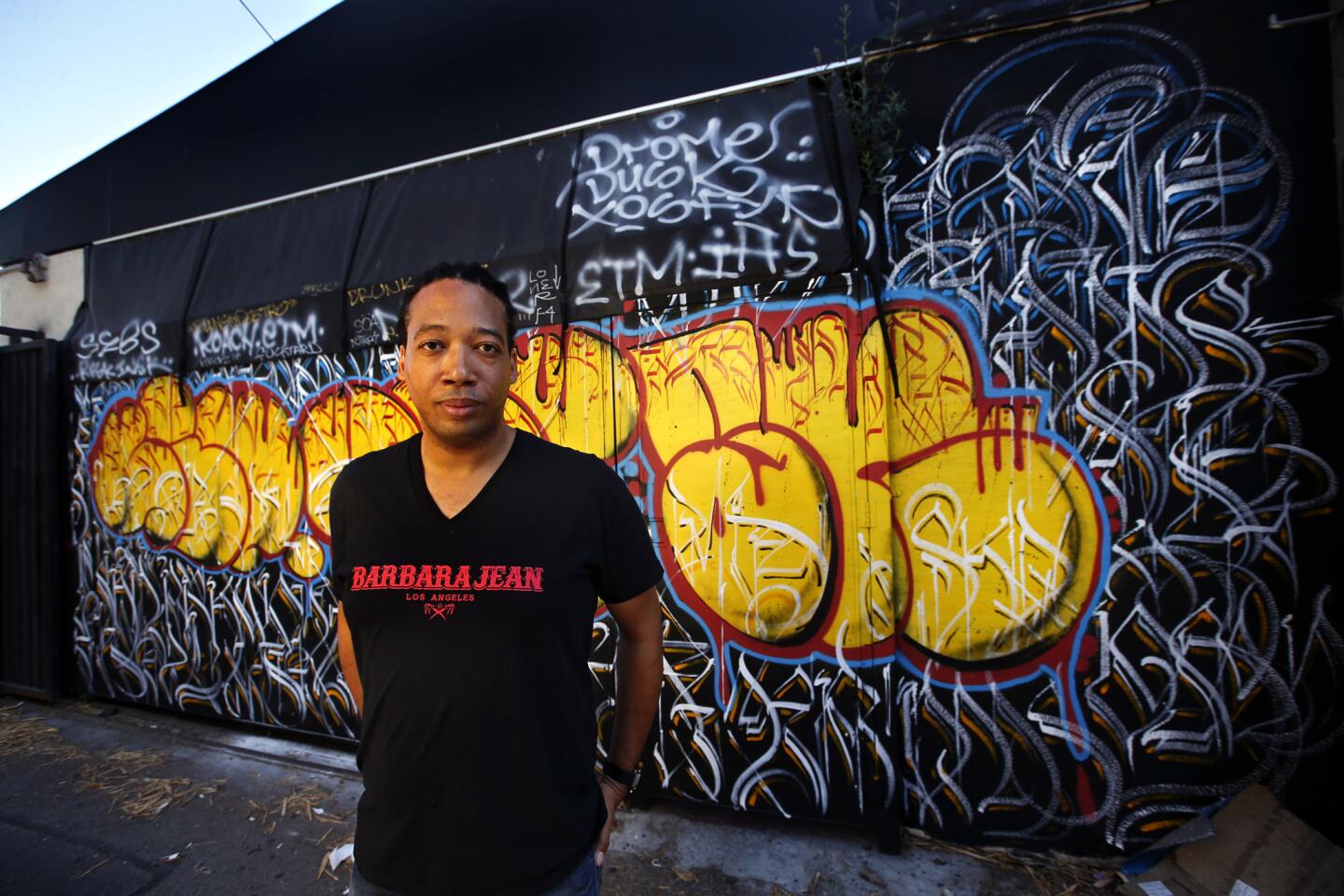Pop-ups and perseverance: How this L.A. chef finally opened his restaurant
- Share via
Not so very long ago, a visit to a new restaurant meant something very predictable happened. You entered under specific signage through heavy doors into a swank universe. There a hostess or maître d’ greeted you like a favorite relative, ushered you to a draped table, through a performance of uniformed servers and low music and diners clustered in geometric order. This is not a lost world, but it is no longer the world we live in. And, maybe more to the point, it is not the world most chefs live in, especially chefs wanting to open their own restaurants, without access to deep-pocketted investors and elaborate support systems.
To find Barbara Jean, the restaurant that chef Jason Fullilove opened in June in the Fairfax neighborhood of Los Angeles, you stroll past the clothing boutiques and tattoo shops that line Melrose Avenue, into the Melrose Umbrella Co., a dim, wood-lined bar. The place looks like a slightly dusty set from Ken Burns’ documentary on Prohibition: high ceilings, exposed Douglas fir beams, retro-clad folks gathered around a watering hole. Pass the drinkers and their highball glasses, up some stairs, past a tiny, crowded kitchen and into the small patio in the back. This is the restaurant, almost hidden at the back of the bar like a reverse speakeasy, and which looks like an art installation crossed with someone’s ’50s-era garage.
There are utilitarian tables and banquettes, and an olive tree dominating the corner. Strung lights traverse the ceiling of the sky — there’s a retractable roof — and a sign spelling the restaurant’s name on the back wall, which is a sliding door decorated like a quilt on the inside, on the outside with arty graffiti. The walls are painted forest green, hung with empty picture frames and haphazard bookshelves. The concrete floor is scuffed and irregularly painted. Helicopters and birds sometimes wheel overhead.
Fullilove, who just turned 40, is a tall man, his long hair is braided and pulled back, and his face can rearrange into a broad smile when he chooses to unveil it. The route he took to this restaurant, named after his mother and serving what he calls “soul food” — vaguely Southern comfort food made with fine-dining technique — is as long and circuitous as a cross-country road trip.
There’s something indelibly Los Angeles about that journey, beginning elsewhere (Cleveland) and winding its way through some of the more iconic of this town’s restaurants — Campanile, now a legend of L.A. dining; Joachim Splichal’s Patina; Clifton’s century-old downtown cafeteria; and a fine-dining restaurant on the Malibu Pier that lasted about as long as a show at the Pantages.
This is the restaurant, almost hidden at the back of the bar like a reverse speakeasy,
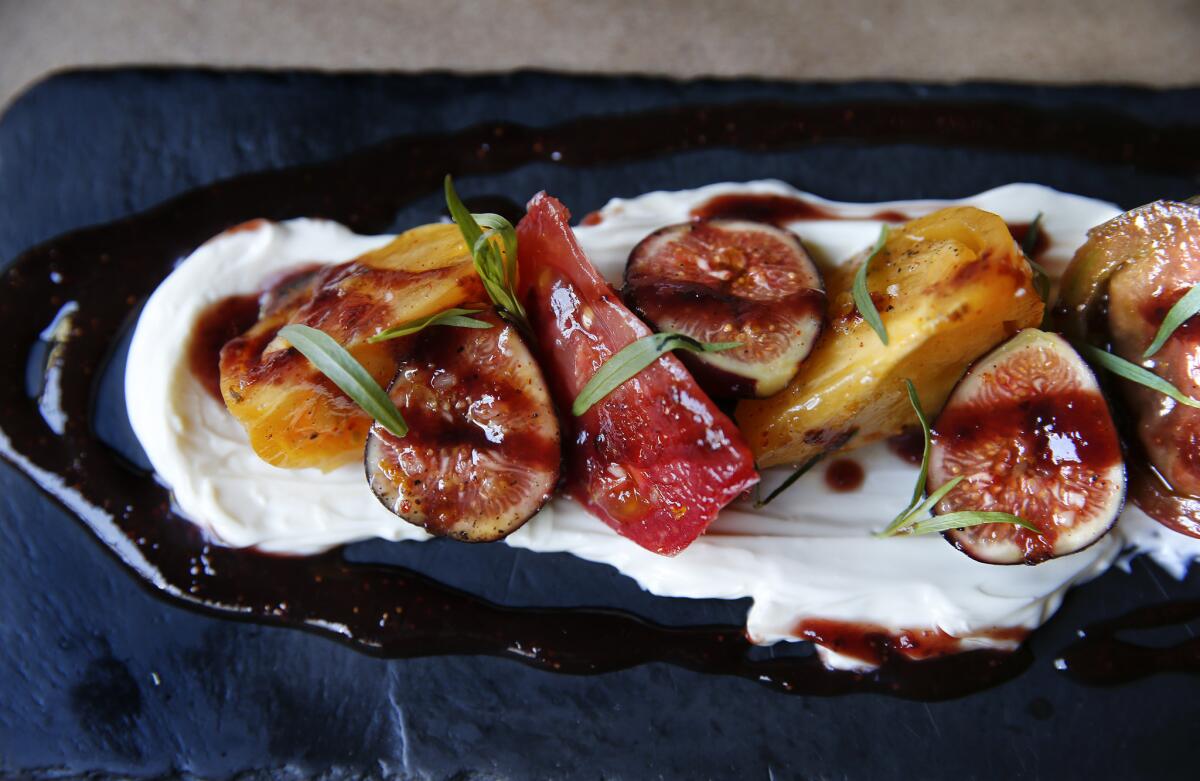
Fullilove began his career conventionally enough. Born in Cleveland, he grew up in Amherst, Mass., where his mother got her doctorate in international education, and lived in New York and for a time in Africa, where his mother set up relief programs. Cooking school at the CIA in New York for continuing education; stints at restaurants in New York and then the Ritz-Carlton in the Virgin Islands. Then, as so many before him, he found himself pulled west.
“I was reading a lot about chefs I admired, and everyone I read about had worked in California,” Fullilove said recently, sitting in one of Barbara Jean’s banquettes. But it was 2009, not a great time to be a looking for a job in any industry. “It was a really tough time. Fine dining was dying out. It was really hard to find a big restaurant company to take me in or work for a hotel — people who had those jobs were just holding on to them.”
Then Fullilove ran into chef Ilan Hall at a farmers market — the Los Angeles version of a job fair — and Hall hired him to help open the Gorbals, the “Top Chef” winner’s downtown restaurant. From there, Fullilove went to work for chef Mark Peel at Campanile and the Tar Pit and for chef Joachim Splichal at his LACMA Café, where Fullilove did a series of pop-up dinners based on the works of Stanley Kubrick and Danny Boyle. Then came an opportunity to open an upscale restaurant on the Malibu Pier, and after that the chance to reopen Clifton’s, the 1935 downtown L.A. cafeteria.
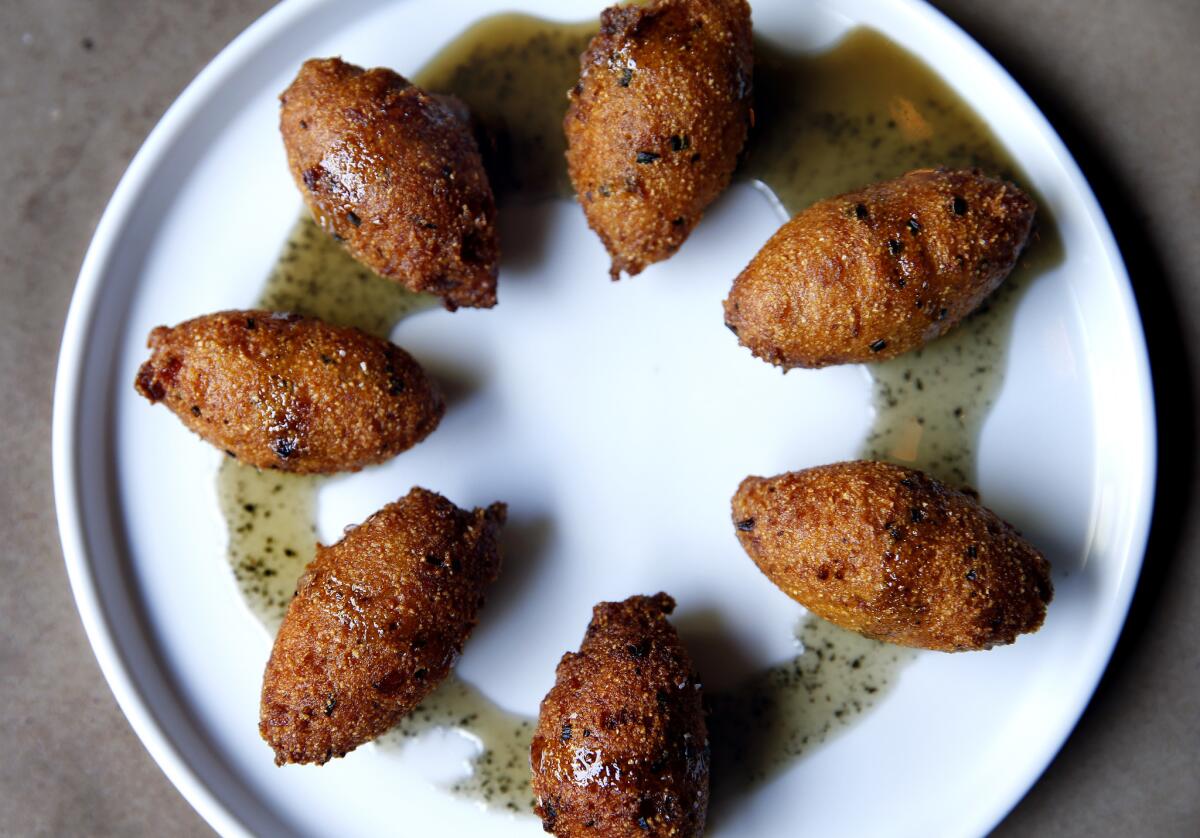
Working in other folks’ restaurants is an exhausting and often transitory life. Owners change, restaurants close, crazy things happen over which you have little or no control. And for most chefs, the goal is always to open their own place anyway. What’s changed over the last few years is how to get there.
“What do you really need to have a good restaurant?” Fullilove asked rhetorically under the sky in Barbara Jean’s dining room. After Clifton’s, and a restorative trip to Europe, the chef earned a living doing catering and working special events. And he’d started doing pop-ups, the temporary restaurants done as chef take-overs that began to gain momentum in the post-recession dining world, with the site Feastly, which has been described as a kind of Airbnb for chefs. His dinners evolved — and with them his idea of a restaurant — over months, at Feastly’s Arts District location, as well as stints in Puerto Vallarta and in New Orleans at Tales of the Cocktail.
Barbara Jean was born in that migratory landscape, a restaurant built in Fullilove’s head and on the repeating plates of those ad hoc meals. And then he found a residency after Smoke.Oil.Salt closed and the owners suddenly needed a chef — and his food and his followers — to fill it.
“I was, like: Hey, guys, want to open a restaurant in 48 hours?” said Fullilove, describing what he’d said to the small staff he’s gathered over years of cooking. After that residency ended, the chef says he went out and looked around for another restaurant that had recently closed, approached the owners, and did pretty much the same thing with the current iteration of Barbara Jean.
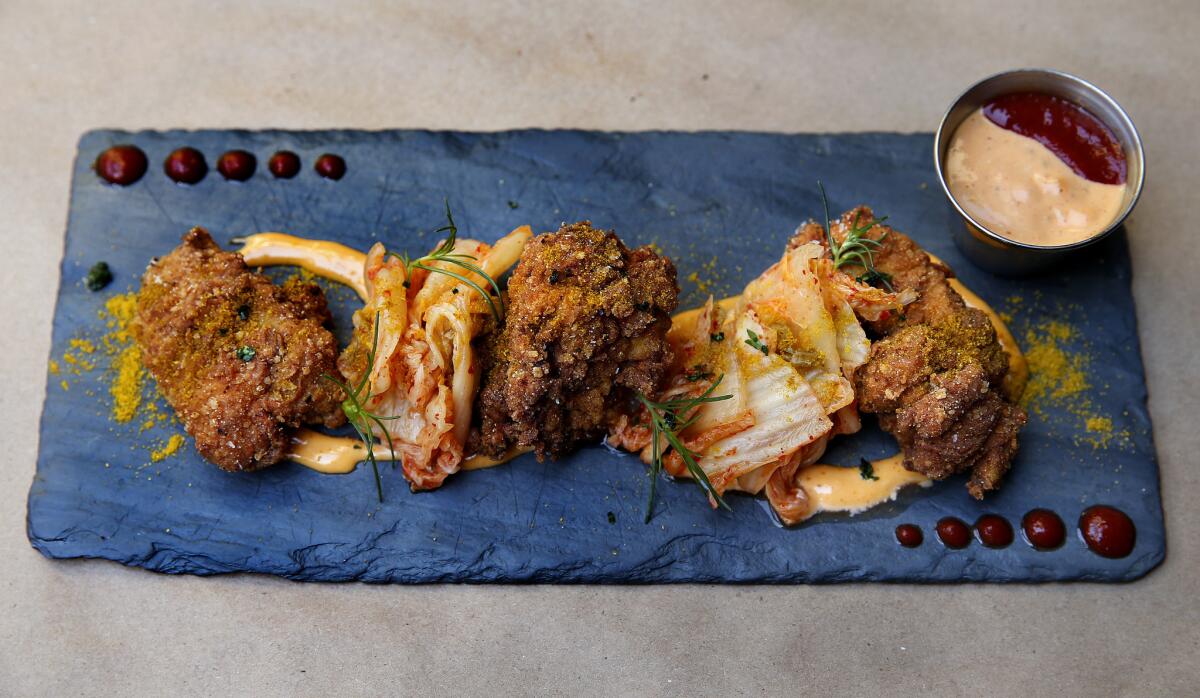
“I could show people what the restaurant was,” Fullilove said of his new business model. “I could show people what I could do with literally nothing.”
“It’s a very versatile and collaborative situation,” said Austin Melrose, who owns the Melrose Umbrella Co. with Zach Patterson, about their partnership with Fullilove, which also includes the bar menu. “Remember the Test Kitchen?” asked Patterson, recalling the circa 2010 Bill Chait project that worked like a restaurant incubator, letting chefs cook for short runs while their restaurants were in development. “We’re able to get creative and do something fun. If it works, it continues working; if it doesn’t, we do something else. This give us the ability to test the waters and play.”
As for Fullilove’s ability to adapt to such a situation and even thrive in it, Peel says: “He’s got a lot of courage. He’s not afraid to try an unconventional venue.”
Thus Barbara Jean, a roofless restaurant backed into a bar, helmed by a chef who can assemble his life’s work almost overnight, like some edible Banksy mural. And this is not DIY casual cooking: Fullilove’ssoul food comes in plates of hush puppies shaped like a pastry chef’s quenelles; fried chicken torqued with curry and paired with kimchi and Thai chile aioli; chicken arranged like a Richard Serra sculpture around a disk not of sauce or mashed potatoes, but a latke woven from shredded yams.
“If the restaurant standard was china and white tablecloths, I’d never have this opportunity,” Fullilove said. “It’s a very different world.”
7465 Melrose Ave., Los Angeles, (323) 718-5142, barbarajeanla.com
More to Read
Eat your way across L.A.
Get our weekly Tasting Notes newsletter for reviews, news and more.
You may occasionally receive promotional content from the Los Angeles Times.
